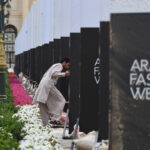The fashion industry is at a critical juncture, demanding innovative solutions to address its environmental impact. At the forefront of this transformation is the Royal Fashion Hub, exemplified by initiatives like the Textiles Circularity Centre (TCC) at the Royal College of Art (RCA). This autumn, the TCC took a significant step by establishing a six-week residency at The Lab E20 in Stratford, a community space founded by RCA Fashion alumnus Christopher Raeburn. This initiative, known as the Regenerative Fashion Hub, served as a dynamic platform for exploring and promoting circular economy principles within the fashion and textiles sectors.
The Regenerative Fashion Hub acted as a living laboratory, inviting researchers to conduct live studies on various facets of the circular economy within fashion. These studies aimed to deepen both public and industry understanding of critical areas such as Circular Materials Design, Consumer Experience, and the Circular Fashion Supply Chain. By opening its doors to the public, the hub actively engaged the community, fostering a greater awareness of the circular economy and its profound impact on material lifecycles and consumer behavior.
The exhibition within the hub was thoughtfully designed as an infinity loop, a powerful visual representation of the cyclical nature of a circular economy. This design effectively highlighted the different stages of textiles – from generation and production to design – enabling visitors to tangibly experience the complete lifecycle of a garment, starting from biowaste and culminating in a finished, wearable product. The hub served as an educational space, encouraging the community to reimagine the fashion and textiles industry and consider viable alternatives like bio textiles and transparent production processes.
Funded by the UK Research & Innovation (UKRI) National Interdisciplinary Circular Economy Research (NICER) programme, the TCC’s work is pivotal in establishing a circular textiles economy for the UK fashion industry. The core objective is to produce high-value textiles from bio-waste, thereby proposing a transformative model for clothing production. This model aims to drastically reduce the consumption of virgin materials and the associated environmental pollution, while simultaneously fostering economic, human, social, and environmental well-being. This vision aligns perfectly with the goals of a royal fashion hub seeking to lead in sustainable practices.
Dr Paul Thompson, Vice-Chancellor of the Royal College of Art, emphasized the significance of the initiative: ‘The Regenerative Fashion Hub is an effective way of sharing the Textiles Circularity Centre’s creative and innovative thinking with the public whilst also allowing the teams to conduct live research. This is a fantastic opportunity to shine a light on the possibilities afforded by transitioning to a circular economy in the fashion industry.’ His statement underscores the RCA’s commitment to using its platform as a royal fashion hub to disseminate crucial research and promote industry-wide change.
Chris Grantham, Executive Director, Circular Economy at IDEO, and IDEO Design Partner to the Textiles Circularity Centre, further elaborated on the transformative potential of the TCC’s work: ‘The TCC’s work offers an exciting and important vision for a sustainable fashion industry. It challenges the widely held assumption that fashion users can only have a disposable mindset and explores how we might become more invested through new fashion services and opportunities to participate as co-creators.’ This perspective highlights the shift towards a more engaged and responsible consumer base, facilitated by forward-thinking initiatives emanating from the royal fashion hub.
Professor Sharon Baurley, Director of the Materials Science Research Centre at the RCA, encapsulated the ethos of the project: ‘We are excited about the possibilities of the pop-up Regenerative Fashion Hub as a place to bring people together to discuss the potentials of regenerative fashion. By sharing our research we can demonstrate that by taking a human centred design approach and offering alternative models for production, we can build resilience in the industry and protect the planet at the same time.’ Her words reinforce the role of the royal fashion hub as a catalyst for collaboration, knowledge sharing, and driving impactful change within the fashion industry towards a sustainable future.
The Regenerative Fashion Hub’s location at The Lab E20, designed by Christopher Raeburn, further amplified its message. Raeburn’s brand RÆBURN is known for its focus on positive fashion and sustainable living, making The Lab E20 an ideal venue to host this pioneering initiative. Supported by Get Living and Fashion District, the Regenerative Fashion Hub exemplifies how collaboration and innovative spaces can drive the fashion industry towards a more sustainable and circular future, solidifying the RCA’s position as a leading royal fashion hub for sustainable fashion innovation.

